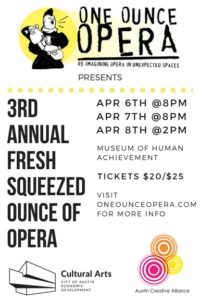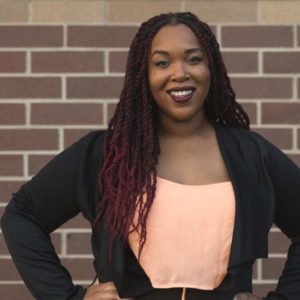 One Ounce Opera is thrilled to introduce Austin to Anthony R. Green, composer/librettist of “Alex In Transition II: Alex and Amy,” a winner of the 2018 Fresh Squeezed Ounce of Opera. His cast — Veronica Williams, mezzo-soprano (Alex) and Charissa Memrick, soprano (Amy) — portray two friends and the complexities of a relationship following a recent transition in this topical and poignant work. The singers had these questions for Anthony:
One Ounce Opera is thrilled to introduce Austin to Anthony R. Green, composer/librettist of “Alex In Transition II: Alex and Amy,” a winner of the 2018 Fresh Squeezed Ounce of Opera. His cast — Veronica Williams, mezzo-soprano (Alex) and Charissa Memrick, soprano (Amy) — portray two friends and the complexities of a relationship following a recent transition in this topical and poignant work. The singers had these questions for Anthony:
1. Is there a personal experience that made you want to write this piece?
Before I composed Alex in Transition, I had a skewed image of people – human beings with feelings and flesh and blood – who did not fit into the gender and sexuality binary. This image came mostly from entertainers like Flip Wilson (and his character Geraldine), Martin Lawrence (and his character Shanaynay), the Men On … characters on the TV show In Living Color, and moments on the TV shows The Fresh Prince of Bel Air and All in the Family. As I grew up and very slowly came into my own queer sexuality, I held on to my negative, ignorant opinion about transgender people, and also noticed how many other of my queer friends did not understand the transgender world. Recognizing this ignorance was personally challenging, and I knew I must immediately rectify it. Therefore, I started doing research, reading books, magazines, articles, websites, and blogs, watching movies, TV shows, documentaries, and consuming as much as I could to help me understand the transgender world. It was at this moment, that I felt the strong need to artistically respond to my inquiry.
2. Would you say that your aria at the end of the 2nd scene of Alex in Transition II is inspired by jazz with possible influence from George Crumb?
The aria at the end of Transition II utilizes a sonnet I wrote in high school, and an art song that I composed in my undergrad. I had personally experienced unrequited love … perhaps too often in high school (!) … and decided to release my angst, sadness, and disappointment in a poem. When I revisited my poetry during my undergrad to use for text setting, this particular sonnet spoke to me. Throughout middle school all the way till the end of my masters program, I accompanied a gospel choir in my hometown of Providence, RI. Always satisfied by the intense emotive release of gospel, I decided to draw upon Gospel idioms for this text setting. As the aria progresses in intensity, I could not help but turn towards more violent gestures and atonal, chromatic sonorities. While I may have been subconsciously influenced by George Crumb (having played Celestial Mechanics around the same time I composed this aria), I did not directly turn to Crumb’s music while composing this work. Rather, the sound world of Crumb and Gospel came through me during the compositional process.
3. Why does Alex change to heightened language in her last aria after speaking in conversational language for the majority of the piece? (Ex: Unrequited love)
The purpose of the switch in language in the aria is two-fold. Throughout the opera, Alex has moments when she is not speaking to the audience or to a character per se, but she is speaking to herself and having a personal interaction with her emotions. This particular aria comes after her femininity is questioned by the woman who is closest to her – a questioning that she never would have expected from her best friend and desired lover. After the argument, she retreats into herself, engaging in a complex inner dialogue that acknowledges her continued love for Amy (I’ll stay with her, for that is who I am) as well as her frustrations (My demons darkest stir within my breast). The switch in language, therefore, distinguishes normal dialogue from inner dialogue, but also captures the complexity of her emotional processes.
4. In your opinion, do you think Amy does have feelings for Alex, but can’t bring herself to say it?
Amy’s relationship with Alex is super complex. Later in the opera, we learn that Amy’s first encounter with Alex was when Alex was still presenting as a man, and obnoxiously flirting with Amy during a college mixer. It was not the most ideal first impression, but through personal and social interactions, they become curious about each other – almost anthropologically – and eventually become best friends. Amy’s persona, however, is demiromantic and graysexual. She does not think so much about relationships, especially with those with whom she is very close. She is focused on her career in science, and does not want to be distracted by the issues that accompany relationships. Furthermore, she honestly cannot remove her past interactions with Alex from her psyche enough to engage in a romantic relationship. But most importantly, Amy knows what type of woman Alex likes, and Amy cannot see herself fulfilling any of these characteristics. In sum, no – Amy does not have any romantic feelings for Alex, but does not want to lose Alex as a friend.
Watch an One Ounce Opera live performance of Alex In Transition: Alex and Amy on YouTube!
____
 The creative output of Anthony R. Green (composer, performer, social justice) includes musical and visual creations, interpretations of original works or works in the repertoire, collaborations, educational outreach, and more. Behind all of his artistic endeavors are the ideals of equality and freedom, which manifest themselves in diverse ways in a composition, a performance, a collaboration, or social justice work. As a composer, his work has been presented in over 20 countries by such notable soloists and ensembles as Gabriela Díaz, Wendy Richman, Ashleigh Gordon, Dame Evelyn Glennie, ALEA III, Sound Energy, The Fidelio Trio, Ensemble Mise-en, Ossia New Music Ensemble, and Alarm Will Sound, to name a few. As a performer (piano, improvisation [voice, koto], conductor), he has appeared at venues across the US, Cyprus, France, the Netherlands, the UK, and South Korea, interpreting solo, chamber, and large ensemble works. For performances, he has worked with numerous student and emerging composers, as well as established composers such as David Liptak, Steve Reich, and George Crumb. Green’s most important social justice work has been with Castle of our Skins (COOS), which is a concert and education series organization dedicated to celebrating Black artistry through music. www.anthonyrgreen.com
The creative output of Anthony R. Green (composer, performer, social justice) includes musical and visual creations, interpretations of original works or works in the repertoire, collaborations, educational outreach, and more. Behind all of his artistic endeavors are the ideals of equality and freedom, which manifest themselves in diverse ways in a composition, a performance, a collaboration, or social justice work. As a composer, his work has been presented in over 20 countries by such notable soloists and ensembles as Gabriela Díaz, Wendy Richman, Ashleigh Gordon, Dame Evelyn Glennie, ALEA III, Sound Energy, The Fidelio Trio, Ensemble Mise-en, Ossia New Music Ensemble, and Alarm Will Sound, to name a few. As a performer (piano, improvisation [voice, koto], conductor), he has appeared at venues across the US, Cyprus, France, the Netherlands, the UK, and South Korea, interpreting solo, chamber, and large ensemble works. For performances, he has worked with numerous student and emerging composers, as well as established composers such as David Liptak, Steve Reich, and George Crumb. Green’s most important social justice work has been with Castle of our Skins (COOS), which is a concert and education series organization dedicated to celebrating Black artistry through music. www.anthonyrgreen.com

Charissa Memrick is a dynamic crossover soprano that has played roles from Ida in Die Fledermaus to The Governess in Turn of the Screw. Ms. Memrick completed her master’s degree at Texas State University in Vocal Performance and Pedagogy and earned a Bachelor’s Degree in Vocal Performance at Wichita State University in 2017 and 2015, respectively. Charissa’s vocal ability is solidified in over a decade of musical theatre, classical, pop and theatre training. Her stage presence is grounded in her passion for expressing the human condition and bringing complex characters to life. Contemporary crossover musical theatre inspired pieces especially show her theatrical prowess. In the future Charissa hopes to flourish in as many performing opportunities as possible in the Austin, Texas area. Ms. Memrick also teaches private voice lessons. She has taught multiple genres including pop, rock, jazz, classical and musical theatre.

Veronica Williams, an up-and-coming mezzo-soprano, is known for her “thrilling instrument” and “overwhelming authority” on stage. Most recently she captivated audiences during the San Antonio Symphony’s Dream Week celebration at the Tobin Center for Performing Arts. She received her Master of Music Degree from Boston’s New England Conservatory of Music, and her Bachelor’s Degree from the University of Texas at Austin. Previous roles include Concepción in Ravel’s L’heure Espagnole, the Old Prioress in Poulenc’s Dialogues of the Carmelites, Hansel in Humperdinck’s Hansel and Gretel, and the title roles of Cesti’s Orontea and Eisler’s Die Mutter. Now based in Austin, Ms. Williams is a proud member of both One Ounce Opera, and the Texas Concert Opera Collective, and has had the privilege of performing with the Austin Opera chorus for its past three seasons. Upcoming roles include the title role of Handel’s Rinaldo, and The Mother in Amahl and the Night Visitors. When Veronica is not performing, she enjoys teaching and guiding talent in her growing voice studio.

